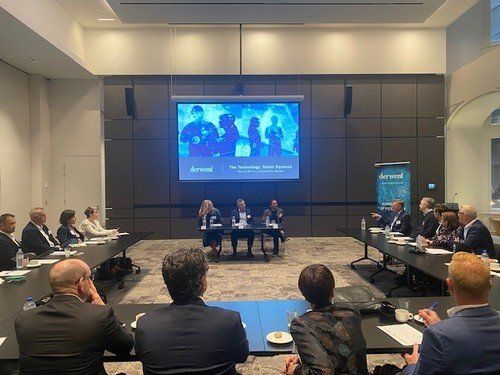News
Technology Talent Squeeze

The key shortage of technology talent has been described as the ‘handbrake on growth’ in the local technology sector, as well as affecting organisations across all industries as they seek to deliver on digital transformation. To help address this issue, Derwent recently hosted an event for senior executives in technology businesses, to share insights on how to win the war for talent in a competitive market.
Warwick Bowd who leads Derwent’s Digital, Technology and Services practice chaired the forum, which was headlined by contributions from panelists Suzy Nicoletti, the former Google and Twitter executive who now leads eCommerce platform Yotpo, and Martin Herbst, former eBay executive who currently leads cloud-based recruitment platform JobAdder.
Some great insights shared by the panel included the following:
- The importance of focusing on nurturing and retaining good people, who are likely being approached by other firms
- The key responsibility of leaders to deliver a great employee experience, which will mean different things to different people
- The importance of having a clear Employee Value Proposition (EVP) which you not only communicate, but actually deliver on
- Understanding what’s really unique about your business when attracting talent, and seeking to differentiate as you do with customers
- Thinking about recruitment as an investment centre not a cost centre, and utilising data to understand effective sourcing channels
- Appreciating that high-growth business can be attractive destinations for talent, given they offer greater autonomy and breadth of opportunity

Share this article
Recent Articles



Sydney
Level 21
123 Pitt Street
Sydney NSW 2000
Australia
sydney@derwentsearch.com.au
Melbourne
Level 28
360 Collins Street
Melbourne VIC 3000
Australia
melbourne@derwentsearch.com.au
Perth
Level 29
1 Spring Street
Perth WA 6000
Australia
perth@derwentsearch.com.au
Brisbane
Level 19
10 Eagle Street Brisbane
Brisbane QLD 4000
Australia
brisbane@derwentsearch.com.au
Sydney
Level 21
123 Pitt Street
Sydney NSW 2000
Australia
+61 2 9223 1855
sydney@derwentsearch.com.au
sydney@derwentsearch.com.au
Melbourne
Level 11
350 Collins Street
Melbourne VIC 3000
Australia
+61 3 9691 1333
melbourne@derwentsearch.com.au
melbourne@derwentsearch.com.au
Perth
Level 15
240 St Georges Terrace
Perth WA 6000
Australia
+61 8 9282 5250
perth@derwentsearch.com.au
perth@derwentsearch.com.au
Canberra
The Realm
18 National Circuit
Barton ACT 2600
Australia
canberra@derwentsearch.com.au
Brisbane
Level 19
10 Eagle Street Brisbane
Brisbane QLD 4000
Australia
+61 2 9223 1855
brisbane@derwentsearch.com.au
canberra@derwentsearch.com.au
Canberra
The Realm
18 National Circuit
Barton ACT 2600
Australia
+61 2 9223 1855
canberra@derwentsearch.com.au
Derwent


